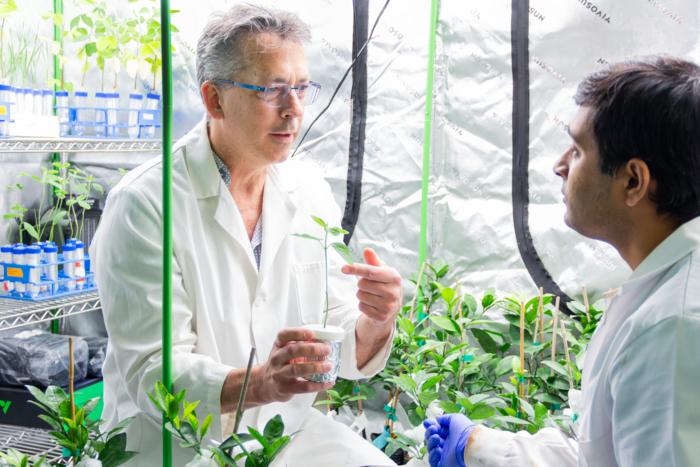Nano-agriculture: Sustainable solutions for global food security

Credit: Carnegie Mellon College of Engineering
Nano-agriculture: Sustainable solutions for global food security
PITTSBURGH—Researchers in the Department of Civil and Environmental Engineering at Carnegie Mellon University are using findings from nanomedicine and digital twin technologies to understand the new field of Plant Nanobiotechnology, address unsustainable agricultural practices, and meet increasing global food demands.
Currently, agriculture accounts for 14-28% of global greenhouse gas emissions and 70% of all freshwater withdraws. This, in addition to a range of other factors from extreme weather events, rampant crop pests, and rapidly degrading soil underlines the need for new agricultural practices and technologies.
In a new study published in Nature Nanotechnology, researchers highlight that Plant Nanobiotechnology approaches can be used to deliver nanoforms of active agents, such as micronutrients or plant protection products, to specific biological targets. As a result, plants become more resilient against disease and harmful environmental factors like extreme heat or salt contents in soil, thus increasing crop yield and overall efficiency. However, because the field of Plant Nanobiotechnology is still in its nascent stages, many of the challenges to implementing new tools like nanocarriers are still unknown to researchers.
To overcome this obstacle, civil and environmental engineering professor Greg Lowry, in collaboration with co-corresponding author Juan Pablo Giraldo at University of California Riverside, colleagues, and students, is looking beyond plants and agriculture to find solutions inspired by nanomedicine.
“We found that the challenges of using nanocarriers to deliver nutrients in plants parallel those in nanomedicine, which has the advantage of being an established and well-studied field,” said Lowry. “While there are some key differences between plants and animals, many important parts of our research have been informed by nanomedicine, including identifying nanocarrier designs that can ensure active agents are effectively packaged, delivered, and released where they are needed.”
Similar to nanomedicine, researchers found that nanocarriers are most successful when they interact well with the organism they’re targeting, navigate key biological barriers, and take advantage of natural processes while minimizing unintended consequences. The study also explored the potentially transformative approach of creating “digital twins” of plants for assessing the efficacy of different nanocarrier designs.
Digital twins are breakthrough modeling technologies that have been widely used throughout infrastructure management, predictive maintenance, and manufacturing. Their unique ability to analyze a structure and its surrounding conditions, process the information, and use it to inform, predict, and modify what happens in the physical world has revolutionized the way researchers process data.
Just as medical researchers use “digital patients,” or digital twin models to simulate how medicines interact with and move within the body, Lowry and his team could use “digital plants” to facilitate the design of nanocarriers that target nutrient delivery to selected plant organs. In doing so, nanocarriers would be better equipped to deliver essential active agents where and when they’re needed most, increasing their effectiveness, resilience to adversity, and overall agricultural output.
“Nano-enabled precision delivery of active agents in plants will transform agriculture, but there are critical technical challenges that we must first overcome to realize the full range of its benefits,” said Lowry. “I’m optimistic about the future of Plant Nanobiotechnology approaches and the beneficial impacts it will have on our ability to sustainably produce food.”
More information:
###
About the College of Engineering: The College of Engineering at Carnegie Mellon University is a top-ranked, engineering college that is known for our intentional focus on cross-disciplinary collaboration in research. The College is well known for working on problems of both scientific and practical importance. Our acclaimed faculty have a focus on innovation management and engineering to yield transformative results that will drive the intellectual and economic vitality of our community, nation and world. The College offers graduate and undergraduate degree programs in biomedical engineering, chemical engineering, civil and environmental engineering, electrical and computer engineering, engineering and public policy, information networking, materials science and engineering and mechanical engineering. Our “maker” culture is ingrained in all that we do, leading to novel approaches and transformative results.
About Carnegie Mellon University: Carnegie Mellon, cmu.edu , is a private, internationally ranked research university with acclaimed programs spanning the sciences, engineering, technology, business, public policy, humanities, and the arts. Our diverse community of scholars, researchers, creators, and innovators is driven to make real-world impacts that benefit people across the globe. With a bold, interdisciplinary, and entrepreneurial approach, we do the work that matters.
Journal
Nature Nanotechnology
Article Title
Towards realizing nano-enabled precision delivery in plants
Article Publication Date
6-Jun-2024



